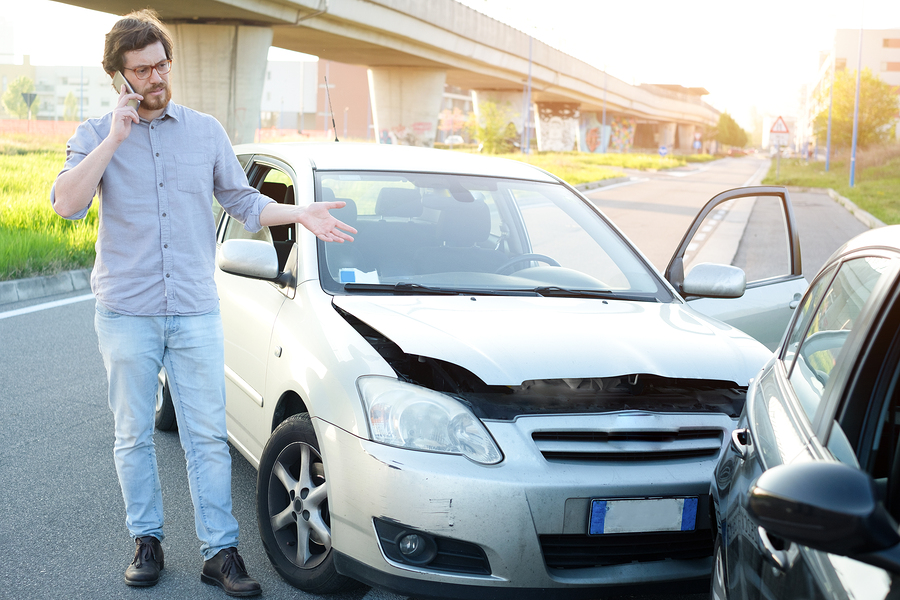Leaving An Accident Scene Has Consequences
 Michael Babboni
Car Accidents
For most people, there’s little doubt about what to do in the event of a car accident, especially once the panic has worn off, and reason reasserts itself. If you find yourself in a vehicular accident, especially if you are unharmed, and your vehicle is still mobile, you should assess the situation, see if anyone else needs help, then exchange information with the other party, if possible, and call the police to report the incident.
Michael Babboni
Car Accidents
For most people, there’s little doubt about what to do in the event of a car accident, especially once the panic has worn off, and reason reasserts itself. If you find yourself in a vehicular accident, especially if you are unharmed, and your vehicle is still mobile, you should assess the situation, see if anyone else needs help, then exchange information with the other party, if possible, and call the police to report the incident.Even if you are involved in an accident where there is no one present, such as knocking over someone’s gate or mailbox at the front of their house, or denting someone’s fender at a parking lot while parking or leaving a parking space, you should exercise responsibility. You should leave notification and contact details with the party that has suffered property damage and, if the damage is over $500, you are still legally required to report the accident.
But what if you don’t do this? What if, while pulling your car out of a parallel parking space, you graze a car and make a minor scrape to the paint that doesn’t even damage the structure of the car, and then you drive off? Or what if you get into an accident, see that people are injured, and flee the scene?
Even if the accident wasn’t your fault, there may be serious consequences for leaving.
When To Report
In the state of Florida, residents have a legal obligation to report a car accident, or call the police, so that they will file the report, if the following should occur:
- An accident with an injury or death
- An accident that is a hit and run, with someone fleeing the scene
- An accident with drunk driving involved
- An accident where the property damage is over $500
Part of reporting an accident means being legally accountable and associated with that accident. To attempt to disassociate yourself from an accident by leaving and hoping no one attaches you at a later to the accident is illegal. At the very least, leaving an accident scene where there are no injuries can be charged as a non-moving violation. So while it’s not necessarily a criminal charge, fines can be involved. More importantly, it’s not a “good look” for a person if he or she is trying claiming to not be responsible, since usually only guilty people try to avoid responsibility by fleeing.
On the other hand, if there are injuries at the accident, and people require medical treatment, but you and your car are in good enough condition to leave, and you do so, this then changes to a criminal violation. The only time this is not the case is if it can be proven, in court, that you were not aware of injuries at the accident, and honestly left the scene believing that no one was hurt, and that less than $500 of damage had occurred.
However, proving that you were unaware of the possibility of injuries if it is a major accident would be extremely difficult, especially if it’s clear that your car alone has probably sustained more than $500 worth of damages. So, in an extreme example, if a truck driver were to collide with a motorcyclist and more or less destroy the motorcycle, as well as send the motorcyclist hurtling through the air and off the road, it would be very difficult for that truck driver to then claim that he drove off, because he didn’t think it was a serious accident, when a motorcycle is impacted on the front of his truck’s grille.
Criminal Charges
Leaving the scene of an accident where there are injuries may result in a second degree felony charge, and you are likely to be charged with a hit and run violation. In the tragic event that you fled the scene of an accident where a death was involved, that is considered a first degree felony in Florida. There may also be lawsuits leveled against you for medical treatment or wrongful death, and possibly even a suspension of driver’s license.
If you get involved an automobile accident, let the expected legal actions run their course. Do not assume that because you sustained no injury, you are free to leave an accident. Always remain at an accident site, and, if it’s clear there are injuries, call the police and render assistance if you are able. Unless an accident is of the mildest kind, there are severe legal consequences for leaving the scene. And if you are thinking of undertaking a lawsuit for personal injury, the fact that you left scene puts you in a very bad position right from the start. Don’t take chances. Do everything that is expected of you after an accident occurs, including remaining present and cooperating with the police.
